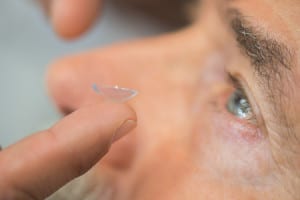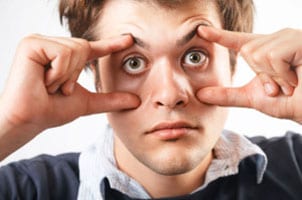Bifocals are a kind of eyeglass that have a line that separates the lenses into two. If you grew up during the 70s and 80s, you probably saw a lot of people wearing these. Well, you won’t see them very much now. Today people wear progressive lenses, the same as bifocals but without that obvious separating line.
The need for progressive lenses, or bifocals, is caused by the natural aging process and affects almost all of us at some point in our lives. We usually start noticing a change when it’s hard to read the fine print, or you need to take your glasses off and look closer at the words in the book to see them. The eyes are no longer able to focus correctly, which is called presbyopia.
Presbyopia happens because as you age, your eyes’ lenses gradually harden. They’re no longer as elastic as they were when you were young, so they have a harder time focusing on the objects around you, especially on nearby objects.
Presbyopia requires a different type of lens correction than nearsightedness or farsightedness. If you only have nearsightedness or farsightedness, you only need single vision lenses. If you have presbyopia, you need lenses that improve these problems. Bifocals, or multifocal or progressive, lenses have multiple focal points to help.
Bifocals or Progressive?
Most bifocal and multifocal glasses have a dividing line between the different prescriptions in the lens. When you wear them, you look down, or through the bottom lens, to see an object that is close, such as reading a book. When you look up, through the upper half of the lens, you are viewing things at a distance. There is a distinct difference between the two, which takes some time to adjust.
Progressives, on the other hand, do not have a line and are made so that change in prescription is less drastic. You still have two prescriptions, but your vision flows from one to the other more smoothly. Progressives cost a bit more than bifocals do, which could be a factor when choosing between bifocals and progressives.
Talk to your ophthalmologist
If you are having difficulty seeing words up close, and you in your 40s, it may be time to speak to your eye doctor. If you need progressive lenses, they will be able to tell and they can talk to you more about whether bifocals, multifocals and progressives would work best for you.
Schedule an appointment with Utah Eye Centers today and learn from our expert doctors.






